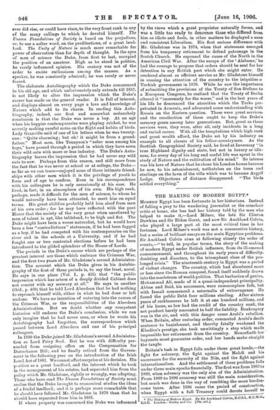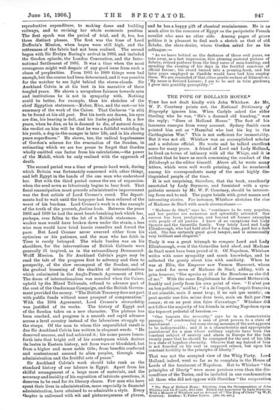THE MAKING OF MODERN EGYPT.* MODERN Egypt has been fortunate
in her historians. Instead of falling a prey to the wandering journalist or the armchair critic at home, she has had her history told by the men who helped to make it,—Lord Milner, the late Sir Clinton Dawkins and Sir Eldon Gorst, and now Sir Auckland Colvin, who played a large part at the most critical time in her fortunes. Lord Milner's work was not a consecutive history, but a series of brilliant essays on the main Egyptian problems. Sir Auckland Colvin aims at following closely the order of events,—" to tell, in popular terms, the story of the making of modern Egypt under British influence, from its ill-omened commencement, and throughout its early years of difficulty, doubting and disasters, to the triumphant close of the pro- longed crisis." The nineteenth century in Egypt was a period of violent changes. The country, which had slumbered more or less since the Roman conquest, found itself suddenly drawn into the maelstrom of world-politics. That barbarian of genius, Muhammad Ali, made of it a quasi-independent principality. Abbas and Said, his successors, were commonplace folk, but with Ismail commenced a saturnalia of extravagance. He found the public Debt four millions sterling. After sixteen years of recklessness he left it at one hundred millions, and of his loans, so low had the credit of the country sunk, the net product barely amounted to half the liability. Bankruptcy was in the air, and with this danger came Arabi's rebellion. When Britain, after restoring order, commuted Arabi's death sentence to banishment, and thereby fatally weakened the Khedive's prestige, she took unwittingly a step which made impossible her retirement from the country. Henceforth her bayonets must guarantee order, and her bands make straight the tangle.
Britain's task in Egypt falls under three great heads,—the fight for solvency, the fight against the Mandi and his successors for the security of the Nile, and the fight against internationalism. And the settlement of these problems falls under three main epochs financially. The first was from 1883 to 1889, when solvency was the only aim of the Administration. From 1889 to 1896 economy was still the main consideration, but much was done in the way of remitting the more burden- some taxes. After 1896 came the period of construction, when Egypt with a full Treasury could devote herself to
* The Making of Modern Egypt. By Sir Auckland Colvin, K.C.S.L, C.LE. London Seeley and Co. [188. net.]
reproductive expenditure, to making dams and building railways, and to revising her whole economic position The first epoch was the period of trial, and it, too, has three distinct phases. The first was the time of Lord Dufferin's Mission, when hopes were still high, and the rottenness of the fabric had not been realised. The second began with Sir Evelyn Baring's arrival in 1883, and included the Gordon episode, the London Convention, and the Inter- national Settlement of 1885. It was a time when the most courageous might well despair of any good issue from such a chaos of perplexities. From 1885 to 1889 things were bad enough, but the course had been determined, and it was possible for the watcher to see light behind the storm-clouds. Sir Auckland Colvin is at his best in his narrative of these tangled years. He shows a scrupulous fairness towards men and institutions he is not in sympathy with. Nothing could be better, for example, than his sketches of the chief Egyptian statesmen-1fInbar, Riaz, and the rest—or his summary of the work of the Caisse. That Cerberus "is still to be found at his old post. But his teeth are drawn, his eyes are dim, his hearing is dull, and his limbs palsied. In a few years, when he dies, as he is doomed to die, of natural decay, the verdict on him will be that he was a faithful watchdog in his youth, a dog-in-the-manger in later life, and in his closing years superfluous." He shows, too, the radical hopelessness of Gordon's scheme for the evacuation of the Soudan, in estimating which we are too prone to forget that Gordon wholly omitted one factor from his calculations,—the power of the Mandi, which he only realised with the approach of death.
The second period was a time of prosaic hard work, during which Britain was fortunately concerned with other things, and left Egypt in the hands of the one man who understood her. Bnt with the third period comes the era of expansion, when the seed sown so laboriously begins to bear fruit. That fiscal emancipation must precede administrative improvement was the first article of Lord Cromer's creed. The depart- ments had to wait until the taxpayer had been relieved of the worst of his burdens. Lord Cromer's work is a fine example of the truth of the proverb, festina lode. Between the years 1883 and 1889 he had the most heart-breaking task which has, perhaps, ever fallen to the lot of a British statesman. A weaker man would have broken down under the strain, a less wise man would have tried heroic remedies and forced the pace. But Lord Cromer never swerved either from his optimism or his patience, and the man who has faith in Time is rarely betrayed. The whole burden was on his shoulders, for the interventions of British Cabinets were generally ill inspired, as in the extraordinary Drummond- Wolff Mission. In Sir Auckland Colvin's pages may be read the tale of the progress first to solvency and then to prosperity, of the slow reconquest of the Soudan, and of the gradual loosening of the shackles of internationalism which culminated in the Anglo-French Agreement of 1904. The doom of internationalism was sounded when the Caisse, upheld by the Mixed Tribunals, refused to advance part of the cost of the Omdurman Campaign, and the British Govern. ment provided the money. " The British Treasury does not part with public funds without some prospect of compensation." With the 1904 Agreement, Lord Cromer's stewardship was justified of its works. The history of Egypt and of the Soudan takes on a new character. The plateau has been reached, and progress is a smooth and rapid advance across a level country instead of the labourious struggle up the steeps. Of the man to whom this unparalleled result is due Sir Auckland Colvin has written in eloquent words. " He deserved success, and had achieved it ; his name passes hence- forth into that bright roll of his countrymen which derives its lustre in Eastern history, not from wars or bloodshed, but from a higher and more noble title; from benefits conferred and contentment assured to alien peoples, through wise administration and the fruitful arts of peace."
Sir Auckland Colvin's work should take rank as the standard history of our labours in Egypt. Apart from his skilful arrangement of a large mass of materials, and the accuracy and lucidity of his exposition of intricate questions, it deserves to be read for its literary charm. Few men who have spent their lives in administration, more especially in financial administration, have attained to so admirable a style. Every chapter is enlivened with wit and picturesqueness of phrase, and he has a happy gift of classical reminiscence. He is as much alive to the romance of Egypt as the peripatetic French novelist who sees no other side. Among pages of grave politics it is pleasant to find such a sketch as that of old Zebehr, the slave-dealer, whom Gordon asked for as his colleague:—
" As we leave behind us the darkness of those evil years, we take away, as a last impression, this pleasing pastoral picture of Zebehr, retired perforce from the busy cares of man-hunting, and spending the evening of his days in the fruitful sunshine of official favour; his sword turned into a pruning-hook, and his later years employed as Candide would have had him employ them. We are reminded of that other gentle recluse at Edmonton: 'My name is Retired Leisure ; I an: to be met in trim gardens; I grow into gentility perceptibly. "











































 Previous page
Previous page